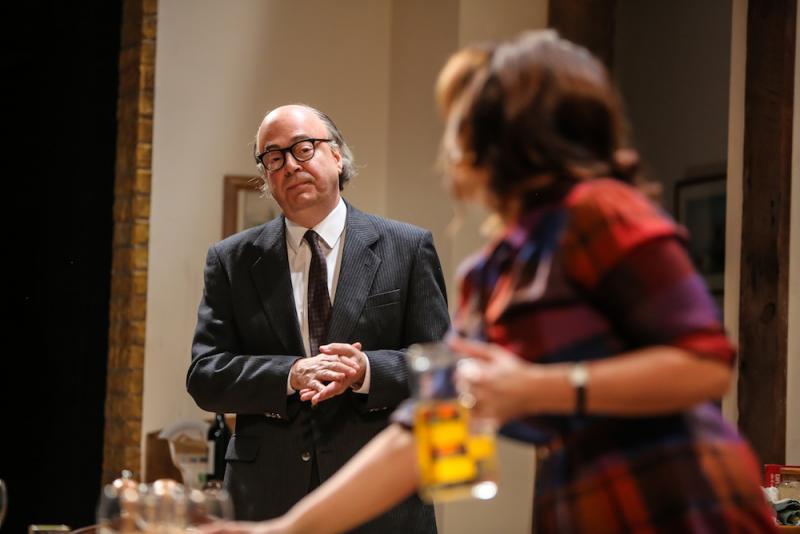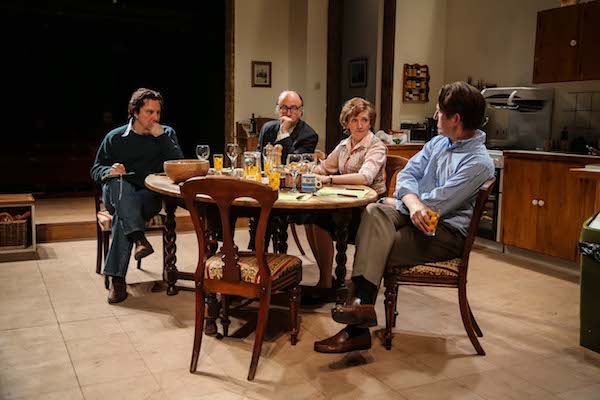Limehouse, Donmar Warehouse | reviews, news & interviews
Limehouse, Donmar Warehouse
Limehouse, Donmar Warehouse
Docudrama about the 1981 Labour Party split is a treat – for politicos

Politics is a serious business, but it’s also a spectator sport. Think of the duels in Prime Minister’s Questions; or the marathon that is Brexit. It’s a place of cartoon villains (Corbyn), straight villains (Trump) and plain cartoons (Boris).
Opening on Budget day, Steve Waters’s new play at the Donmar is a delight for politics buffs. Set entirely in the kitchen of David Owen and his wife Debbie, an interior designer’s dream in an obscure corner of Limehouse (there's more than one joke about how hard it is to find this area of East London), the 105-minute play cleverly condenses the story of the foundation of the Social Democratic Party (SDP) in 1981. On the morning of Sunday 25 January, a group of senior right-wing Labour Party members – Owen, Roy Jenkins, Shirley Williams and Bill Rodgers – meet in secret and split from the party to set up their own. If you don’t recognise these names, then there are three useful essays in the programme that help to fill you in.
The protagonists have the air of the deluded and the doomed
Known as the “Gang of Four”, their drastic move was a response to the success of left-wing militants within the Labour Party. The previous day the party – in opposition while an initially unpopular Margaret Thatcher was shrilly devastating the economy – had held a special conference at the Wembley Arena. As one left-wing measure followed another, the four were appalled and concluded that Labour could not be saved. Instead, they decided to create a new, alternative, party of the centre left. It hardly needs saying that these events resonate with Labour’s current woes as several senior figures have rebelled against Jeremy Corbyn, who, like Michael Foot in 1981, is seen as an unelectable radical.
Limehouse is a highly intelligent account of the birth of the SDP. Of course, it summarises weeks of discussions and decisions into one manageable meeting, suggesting that on the morning of that fateful Sunday there was all to play for. Waters characterizes his protagonists with great clarity. Owen is seen as the prime mover and shaker, manipulative and effective, pushing and pushing his colleagues into making the split. Jenkins is a bon viveur and has-been (in another resonant moment he castigates the left for being against Europe), while MPs Williams and Rodgers express the pain of splitters whose whole lives had been defined by allegiance to Labour. Waters also underlines the role of Debbie Owen, an American literary agent, who not only supports her husband’s ambitions, but also tries to temper his hot-headed abruptness. She is shown smoothing over the ruffled egos of the other three as Owen lets his passions get the better of him. She also gets to deliver an epilogue in which she briefly discusses what happened to Labour and the SDP, and this might help younger audience members get a handle on the significance of this historical episode. Since we know that the SDP signally failed to break the mould of British politics, with the first-past-the-post electoral system diluting the new party’s support, the protagonists carry with them the air of the deluded and the doomed. Knowing they will not succeed gives their aspirations a dose of dramatic irony.
Waters also underlines the role of Debbie Owen, an American literary agent, who not only supports her husband’s ambitions, but also tries to temper his hot-headed abruptness. She is shown smoothing over the ruffled egos of the other three as Owen lets his passions get the better of him. She also gets to deliver an epilogue in which she briefly discusses what happened to Labour and the SDP, and this might help younger audience members get a handle on the significance of this historical episode. Since we know that the SDP signally failed to break the mould of British politics, with the first-past-the-post electoral system diluting the new party’s support, the protagonists carry with them the air of the deluded and the doomed. Knowing they will not succeed gives their aspirations a dose of dramatic irony.
Polly Findlay’s effective production, attractively designed by Alex Eales, features the projected image of a large electronic clock, which in the scene changes ticks down the minutes until the arrival of the press. Her cast (pictured above) is led by an energetic Tom Goodman-Hill as Owen, and features a super performance by Roger Allam as the lisping and pompous patrician Jenkins, who is more interested in wine (yes, Debbie has acquired a bottle of Chateau Lafitte) than press releases. Allam manages to infuse phrases such as “I am replete” with just the right amount of comic absurdity. Nathalie Armin brings out Debbie’s emotional intelligence, while Debra Gillett suggests some of the steel in Williams’s character. Paul Chahidi mixes physical comedy (Rodgers has a bad back) with that rare commodity: political sincerity. The result is a treat for politicos and those interested in mighty moments from the past, but for others the comedy of the piece might not be enough to outweigh its obscurity. If you don’t already know the story, you’ll definitely need to do your homework.
rating
Explore topics
Share this article
The future of Arts Journalism
You can stop theartsdesk.com closing!
We urgently need financing to survive. Our fundraising drive has thus far raised £49,000 but we need to reach £100,000 or we will be forced to close. Please contribute here: https://gofund.me/c3f6033d
And if you can forward this information to anyone who might assist, we’d be grateful.

Subscribe to theartsdesk.com
Thank you for continuing to read our work on theartsdesk.com. For unlimited access to every article in its entirety, including our archive of more than 15,000 pieces, we're asking for £5 per month or £40 per year. We feel it's a very good deal, and hope you do too.
To take a subscription now simply click here.
And if you're looking for that extra gift for a friend or family member, why not treat them to a theartsdesk.com gift subscription?
more Theatre
 Punch, Apollo Theatre review - powerful play about the strength of redemption
James Graham's play transfixes the audience at every stage
Punch, Apollo Theatre review - powerful play about the strength of redemption
James Graham's play transfixes the audience at every stage
 The Billionaire Inside Your Head, Hampstead Theatre review - a map of a man with OCD
Will Lord's promising debut burdens a fine cast with too much dialogue
The Billionaire Inside Your Head, Hampstead Theatre review - a map of a man with OCD
Will Lord's promising debut burdens a fine cast with too much dialogue
 50 First Dates: The Musical, The Other Palace review - romcom turned musical
Date movie about repeating dates inspires date musical
50 First Dates: The Musical, The Other Palace review - romcom turned musical
Date movie about repeating dates inspires date musical
 Bacchae, National Theatre review - cheeky, uneven version of Euripides' tragedy
Indhu Rubasingham's tenure gets off to a bold, comic start
Bacchae, National Theatre review - cheeky, uneven version of Euripides' tragedy
Indhu Rubasingham's tenure gets off to a bold, comic start
 The Harder They Come, Stratford East review - still packs a punch, half a century on
Natey Jones and Madeline Charlemagne lead a perfectly realised adaptation of the seminal movie
The Harder They Come, Stratford East review - still packs a punch, half a century on
Natey Jones and Madeline Charlemagne lead a perfectly realised adaptation of the seminal movie
 The Weir, Harold Pinter Theatre review - evasive fantasy, bleak truth and possible community
Three outstanding performances in Conor McPherson’s atmospheric five-hander
The Weir, Harold Pinter Theatre review - evasive fantasy, bleak truth and possible community
Three outstanding performances in Conor McPherson’s atmospheric five-hander
 Dracula, Lyric Hammersmith review - hit-and-miss recasting of the familiar story as feminist diatribe
Morgan Lloyd Malcolm's version puts Mina Harkness centre-stage
Dracula, Lyric Hammersmith review - hit-and-miss recasting of the familiar story as feminist diatribe
Morgan Lloyd Malcolm's version puts Mina Harkness centre-stage
 Reunion, Kiln Theatre review - a stormy night in every sense
Beautifully acted, but desperately grim drama
Reunion, Kiln Theatre review - a stormy night in every sense
Beautifully acted, but desperately grim drama
 The Code, Southwark Playhouse Elephant review - superbly cast, resonant play about the price of fame in Hollywood
Tracie Bennett is outstanding as a ribald, riotous Tallulah Bankhead
The Code, Southwark Playhouse Elephant review - superbly cast, resonant play about the price of fame in Hollywood
Tracie Bennett is outstanding as a ribald, riotous Tallulah Bankhead
 The Lady from the Sea, Bridge Theatre review - flashes of brilliance
Simon Stone refashions Ibsen in his own high-octane image
The Lady from the Sea, Bridge Theatre review - flashes of brilliance
Simon Stone refashions Ibsen in his own high-octane image

Add comment